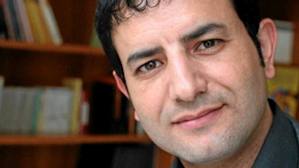Books: Spying on Viale Marconi's Egyptians

ROME --The strength of Amara Lakhous’s second novel, Divorce Islamic Style, is his deep insight into the underworld of Muslim immigrants and their interaction with the dark side of Italy.
In his debut novel, Clash of civilisations Over an Elevator in Piazza Vittorio, the Algerian Lakhous blew open the previously hidden world of tens of thousands of workers and refugees from developing countries who scrape a living as domestic and hotel staff or street traders in the Eternal City, contending with racism and rogue employers in a struggle that is a long way from the dolce vita Italian lifestyle associated with Sophia Loren, Gina Lollobrigida and the other stars of Hollywood on The Tiber era.
Divorce Islamic style pursues his investigation of the plight of this underclass but at the same time pokes fun at what Lakhous evidently sees as the cultural baggage they bring with them such as Islam’s quirky divorce code, a subject together with the status of women in general that is highly controversial in his native Algeria where the military-backed government has curried favour with fundamentalists by retaining an archaic family code denying women fundamental rights.
Just as Egypt’s nobel-prize winner, Naguib Mahfouz, who evidently is a major influence on both books, recounted the lives of Cairenes in a single street or neighbourhood of the Egyptian capital in the books of his Cairo trilogy, Palace Walk andSugar Street, Lakhous takes apparently ordinary people living in a piazza or street of Rome and watched this microcosm of struggling humanity ferment.
Piazza Vittorio near Rome’s main railway station was Lakhous’s own home but in recent years it has become gentrified with artists’ lofts, homes for the prosperous employees of the UN agencies enjoying tax-free salaries in Rome and fewer immigrants than in the past. The Algerian maestro’s new locale is the Viale Marconi, an artery lined with market stalls by day and hookers from Balkan countries by night that runs down to the river Tiber from the old popular quarter of Trastevere.
The anti-hero of the yarn is Christian, a Sicilian born into Tunisia’s Italian community who is recruited by the Italian secret service to pose as Issa, a Tunisian in search of work, so as to infiltrate the Muslim immigrant communities in Rome and penetrate terrorist rings.
Christian is an unlikely spy who has doubts when approached first by “Captain Judas,” his contact in SISMI military intelligence. “To tell the truth, the word ‘country’ gives me shivers only when I hear the national anthem at international matches,” he says. “Outside a soccer game I have trouble understanding the meaning of it … Maybe in our imagination it’s hard to detach ‘country’ from ‘war’ – like Benito Mussolini, just to be clear.”
In addition to lampooning the cynical and often paranoid world of Italian spooks and their purported CIA associates, Lakhous takes up the cudgels on behalf of subjugated Arab women, exploring the tensions between their strict upbringing and the liberation offered when they move to European societies to accompany emigrant husbands.
The heroine of the book, Sofia, a hairdresser, is disenchanted with her spouse, an Egyptian trained as an architect reduced to working as a pizza chef in the Eternal City, and through a series of Roman farce situations falls in love with Issa when her oafish husband opts for divorce.
Sofia’s interior musings on the plight of young girls’ rites of passage in the Arab world are among the most convincing sections of the book, describing for instance the horrors of female circumcision. “It’s a true crime against humanity, worse than rape, because the instigators are the parents! … would female circumcision exist without the family?”
By focussing on the plight of Egyptians, the largest group of immigrants in Italy who now staff most of Rome’s pizzeria ovens, Lakhous also underlines implicitly that his homeland Algeria, for all its faults, in some ways is a more advanced society than that of Egypt. “… in the Maghreb female circumcision doesn’t exist,” Sofia ponders, “Why is it so prevalent in Egypt (even among Coptic Christians), in Sudan and countries of the Gulf, but not anywhere else?”
The book is far from flawless. Not everyone will like the pungent language of immigrant dialogue as translated from the Italian by Ann Goldstein, punctuated as it is with a hefty dose of Anglo-saxon expletives.
And the book’s ending is ingenious but anti-climactic, and some may find it bordering on bathos. Yet this could also be said also of Lakhous’s seminal work, Clash of Civilisations, which touched a nerve because of its superb sense of place.
In Divorce Islamic Style Lakhous has broken new ground and struck gold by mining a rich vein of cultural tension, but he still has a long way to go before becoming a writer of the depth and genius of Albert Camus, with whom he sometimes has been compared because of their common Algerian background and interest in the little people of the southern Mediterranean.
Still in his early 40s, however, Amara Lakhous is a precocious talent evidently learning fast. He has not yet perhaps broken into the ranks of great literature but he is sure to surprise and delight the critics again as he pursues his relentless research into life at the sharp end of modern Italy.
Divorce Islamic Stlye, by Amara Lakhous, Europa Editions, 2012.



